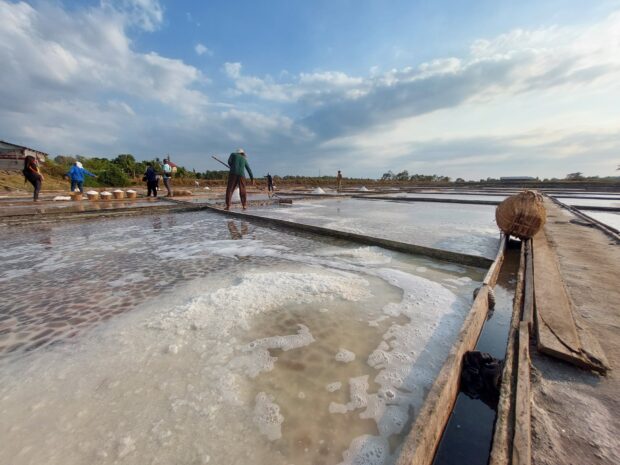
Salt farmers harvest the mineral in Dasol, Pangasinan on Thursday, March 9, 2023. (INQUIRER.net/Jean Mangaluz)
MANILA, Philippines — A comprehensive plan to boost the country’s once vibrant salt industry has been approved by the House of Representatives on the third and final reading, with 287 lawmakers present voting in its favor.
House Bill (HB) No. 8278, which details how the salt industry can be supported, was deliberated during Monday’s plenary session, almost eight months after committee-level discussions started.
Speaker Ferdinand Martin Romualdez said that it is important for the country to adopt a roadmap for reviving the salt industry because the country — despite being surrounded by saltwater — currently imports tons of salt.
“The significance of the salt industry hasn’t been lost on our President and concurrent Department of Agriculture (DA) chief Ferdinand ‘Bongbong’ Marcos Jr,” Romualdez said in a statement.
“He knows that we need to correct the sad irony that the country imports nearly 550,000 metric tons (MT) or 93 percent of its requirement for salt. This is indeed a sin,” he added.
If the bill is enacted, a Philippine Salt Industry Development Roadmap will be created to contain the “programs, projects, interventions, and incentives” that would be needed “for the development and management, research, processing, utilization, modernization, business development, and commercialization of Philippine salt.”
The bill mentions the following objects of the roadmap:
- Increase salt production in order to attain salt self-sufficiency and become a net exporter of salt.
- Encourage salt farming and expand the number of salt-producing areas.
- Ensure sustainable production, management and harvesting, and soil and water conservation practices in salt-farming areas.
- Promote public and private investments in the salt industry development programs.
- Ensure the sustainability and viability of the salt industry through the establishment of cooperatives among salt farmers and salt producers in order to optimize local production and improve access to government interventions, assistance, and incentives.
- Advance market access for Philippine salt products locally and internationally.
- Extend technical and financial assistance for the development, processing, commercialization, and marketing of Philippine salt products.
- Develop and distinguish categories of salt areas into artisanal salt production areas such as gourmet salt-producing areas, iodized salt-producing areas, salt ecotourism sites, and similar sites or areas, and provide appropriate incentives.
- Introduce new salt development technology based on robust research and development (R&D) activities.
- Provide continuous training and capacity building in the salt industry development.
- Provide technical and financial assistance in the local design and fabrication of high-capacity processing equipment and machinery for the salt industry.
- Adopt a program for the active formation of cooperatives of salt farmers pursuant to Section 21 of this Act
- Support R&D activities for salt revitalization
The bill was approved on second reading last May 24.
During one of the committee hearings last October 2022, stakeholders of the country’s salt business warned that the Philippines would import 96 percent of the salt needs by 2030 if the industry is not revived.
Philippine Association of Salt Industry Networks (PhilASIN) president Gerard Khonghun said that if the bill is not enacted, the local industry may miss out on being self-sufficient and would just rely mainly on imported salt.
“The [forecast] annual importation by 2030 is about 1.3 million tons worth P6 billion. At that point, if we do nothing or if we don’t pass this measure, if the country does not gather around and have a strategy […] we will have about 96 percent imported salt,” said the PhilASIN leader.
Khonghun also said the country presently consumes around 600,000 to 680,000 tons of salt annually. However, the passage of Republic Act No. 11504 or the Coconut Farmers and Industry Fund Act would create a demand of 300,000 tons as farmers use salt for fertilizers.
All in all, he said the country might need somewhere around 980,000 tons of salt per year.